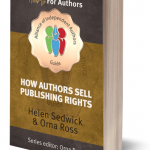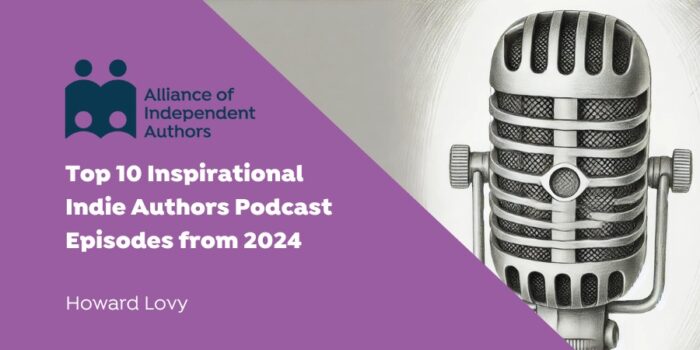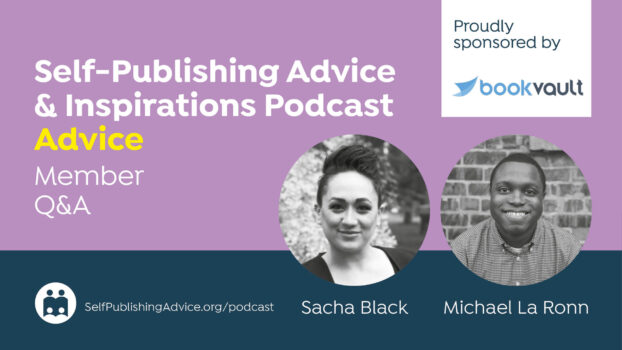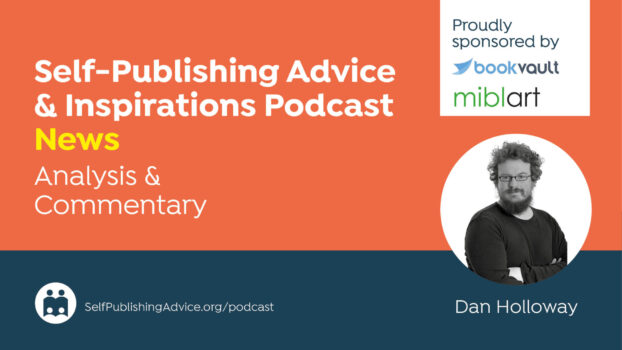Too many indie authors focus only on e-books on Amazon, says ALLi Director Orna Ross, in her First Monday Opinon Post this month, or talk about having their books “picked up” by a trade publisher, and hand it over lock, stock and barrel. To self-publish well we need to take a book through the three phases of publishing: making the book, selling the book, and licensing the rights embedded in the book.
As part of ALLi's “Going Global” campaign, we're launching a new guidebook, How Authors Sell Publishing Rights, which I wrote together with ALLi's legal advisor, Helen Sedwick.
As indie authors know so well, monster myths and misconceptions abound in the writing and publishing world about self-publishing. One such myth is that we authors cannot sell our own publishing rights: reprint rights, translation rights, film & TV rights and all the other rights embedded in our books.
Indie Dean Wesley Smith calls it one of publishing's “sacred cows” and like all good indies, he answers the argument with his actions, and thereby kills the cow. He, and his author wife, Kristine Kathryn Rusch, have sold publishing rights to lots of publishers, and Dean is one of the authors featured in How Authors Sell Publishing Rights.
I learned a lot writing this book with Helen, one of self-publishing's foremost legal experts, but the main thing was something I already know but cannot hear often enough: Success in selling rights, like success in all the aspects of self publishing (and indeed in life), is down to mindset more than any other single factor.
The same self-sabotaging resistance that prevents so many authors from finishing the book, from getting it made, from selling it well, is at play when it comes to selling rights too.
If we think, as so many indies do, “I don't know how,” or “I don't want to deal with trade publishers, I'm indie,”or “it's too much work,” or “Yay! You want to publish my book! Thank you, thank you!”, we are cutting ourselves off from a potentially lucrative area, that can garner us many more sales and readers.
Indie Authors & Publishing Rights
As self-publishers, we are advantaged in the rights arena.We own all our publishing rights and we can sell them wherever, whenever and to whomever we want. The extra income and extra readers that publishing rights represent are already ours, thanks to copyright law. Knowing this, many agents and publishers offer and oversee “rights grab” contracts.
By educating and empowering ourselves, indies can do very much better in this arena than the deals traditionally offered to authors. Selling rights is not easy, for anyone, but it is ever more possible for authors, as sales and pitches move more towards email, and digital platforms like IPR License and Pubmatch emerge. This will always be an arena where relationships are important but like every aspect of publishing, digital is changing the landscape.
If we want it to change in our favor, we need to approach rights with an indie author mindset.
What Are Publishing Rights?
Rights are divided into primary (in trade-publishing called “volume” rights) and subsidiary (“sub”) rights. The main rights of concern to authors are translation, TV and film, and reprint rights, but there are a long string of sub-rights, including merchandising, book club, serial, anthology, abridgement and many others.
Publishing rights are not something a beginning self-publisher needs to think about. Once you have one or more books selling well in ebook, and/or POD and/or audio (the three primary self-publishing formats), that's when you begin to explore the possibility of selling other publishing rights.
Not only because trying to do so beforehand is to set yourself too many learning tasks at once but because rights buyers are only interested in books that already are succeeding.
Reprint Rights
When agents, scouts and publishers come calling, as they always do when indie books are doing well, we need to keep a rights mindset in place. Most publishers will offer a contract that asks for world English-language rights, including ebook rights. Many authors jump at this, thinking a trade publisher will sell more books than they have managed to but we are seeing that is far from always the case. The best option for an indie, generally speaking, is to hold onto e-book rights (and probably the a-book rights) and trade the print rights.
That's where the negotiation should begin.
It's always a negotiation — or should be. That's what publishers and agents expect. You will need to analyze the contract offered and think carefully about whether this is the best option for you. Our book explains the issues you need to be aware of. Of course you will be delighted that somebody wants to invest money in your book but keep the delight for your family and friends. With publishers and agents keep your business hat on, at least until the deal is done.
A Rights Mindset
As Helen and I worked on this book, we had many thoughts and conversations with, and about, indie authors and came to understand that a shift in perspective is necessary in the indie author community.
When you shift to understanding that a good book can be sold on many platforms, in many territories and languages, and turned into various formats and, crucially, when you are prepared to do what it takes to succeed in doing that, it's an empowering moment.
It doesn't all have to be done at once and sometimes it happens without trying.
Andrew Weir self-published The Martian as a serialized story on his website, later as a 99-cent e-book. Lots of people don't know that this book is a self-publishing rights success story.
When his Amazon sales took off, audiobook publisher Podium Publishing sought him out and his audiobook won a ton of awards. Weir was then approached by an agent, and together they sold print rights to a major publisher for a six-figure sum, and film rights, to 20th Century Fox.
Weir’s story illustrates how a writer’s imagination and persistence can create a property so valuable, so compelling, it makes millions for author, agent, publisher and film producer and takes a book to readers who would never otherwise have discovered it.
Of course, we won't all spawn Hollywood blockbusters and selling publishing rights is challenging for all, self- and trade-publishers alike. Attending book fairs, going on rights sales trips, negotiating with overseas publishers and TV and film producers is not for the fainthearted.
But we're not fainthearted, we're indie authors! We know it happens one step at a time, and we know that we have each other's help along the way.
Yes, support is needed (and ALLi tries to provide it, see below). This is a growth area and one to watch. We're seeing more and more authors make good deals and partnerships. We can all add to our bottom line, and readership, by savvy exploitation of our publishing rights. It makes sense for trade-publishing and it makes sense for indie-publishing.
Learning how to trade our rights is part of learning how to be a good publisher.
Member rights services at The Alliance of Independent Authors include a dedicated literary agent, representation at London and Frankfurt Bookfairs and Book Expo America, and one-to-one consultancy from digital rights platform, IPR Licence. More details here
Members also receive How Authors Sell Publishing Rights, a guidebook to help authors navigate today’s complex rights marketplace (all our guides are free to members). This book shows writers the best ways to reach decision-makers in various industries, what these rights-buyers are looking for, and what to expect in negotiating rights sales, with sections on how to pitch, negotiate and close a sale with producers, literary agents and global publishing houses. Also: how to manage book fairs and other sales trips, and how to keep track of your rights business.
Non-members can pre-order here
Are you thinking about licensing your publishing rights? #selfpub #IARTG @OrnaRoss Share on X











[…] Opinion: Indie Authors Need To Think About Publishing Rights […]
[…] contract. As selling ebooks get tougher, it is those authors with a genuine indie mindset and a rights perspective on publishing, who are seeing and, crucially, sustaining […]
Thanks for this, Orna.
As you’ll know from The International Indie Author blog and FB Group, this is a constant theme of mine. The need for authors to step out of the “I’m a one-format, one-retailer, one-market, one-country ebook author” box and to claim our place in the Global New Renaissance. unfolding.
We need to think of ourselves not as ebook authors but as content-suppliers in which our ebooks are just the first step on a long and exciting journey.
To what you’ve said above I would add two pints:
First that, as well as directly licencing rights, we can seek out and partner with specialists in other media directly to co-create finished products – screenplays, radio plays, whatever – that will stand an even better chance of being picked up.
It’s one of the sad contradictions of indie publishing that we constantly hear the refrain “we don’t need publishers” and “we want full control and can do it all ourselves” alongside constant complaining about how it’s all too much hard work and we haven’t time and it’s too expensive.
Bottom line is we can all take the path of least resistance, stick our ebooks out on Amazon and hope some big producer of films/audio/TV/radio/whatever comes knocking or we suddenly become global stars.
It happens.
But if we are serious about being authors – not just ebook authors but content-suppliers reaching global audiences across all formats – we need to frequent those roads less travelled by.
Second – this for established authors, not beginners – we can create properties with multi-media opportunities built in.
For example, writing more visually, with future screenplays or TV series in mind.
We can write more serially, working storylines to regular lengths for serialization not just to read (lots of serialization opportunities for ebooks) but for audio – serialized a-books released as podcasts, for example, or for radio, or for TV.
While some books need to be as long as they need to be, others can benefit from the stricture of uniform-length parts that will make them more appealing for rights licencing as TV or radio series, or indeed partnering with specialist authors to create finished radio or TV series to sell.
As the Global New Renaissance unfolds we have unparalleled opportunities not just to reach new audiences literally worldwide, but to explore new ways of delivering our works to those global audiences.
.
[…] Source: Opinion: Indie Authors Need To Think About Publishing Rights […]
Great post!! Orna, The information shared by you could be useful for many “Independent Authors and Self-Publishing Authors”. Thanks for sharing.
[…] Opinion: Indie Authors Need To Think About Publishing Rights | Self-Publishing Author Advice from Th… […]
Sounds like an excellent read. I feel I have lots of questions I haven’t even thought of yet!
You can always pop back and ask, Lorna! Good luck with your rights strategy!
[…] Education is needed to convince authors of the absolute need to invest in good, qualified editors, in particular, and the other publishing processes. Reaching readers is a tough challenge for all, especially those in over-supplied and under-read genres like poetry, literary fiction, memoir and narrative nonfiction. And good author-publishers also understand publishing rights and how to sell them. […]